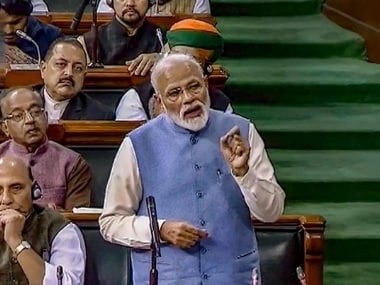In his first speech in the new Lok Sabha on 25 June — the day Indira Gandhi imposed the Emergency 44 years ago— Prime Minister Narendra Modi reminded the Congress of its ‘sins.’ On Tuesday, when Modi began his reply to the motion of thanks on the president’s address in the Lok Sabha, he made it clear that while the Opposition is still in “election mode,” he would not follow the suit and instead preferred laying down a road map for a ‘New India.’ The reference to “election mode” made by Modi was in the context of certain ‘unparliamentary’ remarks by Adhir Ranjan Chowdhury, leader of Congress party in the Lok Sabha on Monday, while speaking during the debate in the House on the motion of thanks on the president’s address. [caption id=“attachment_6080081” align=“alignleft” width=“380”]  File image of Prime Minister Narendra Modi. PTI[/caption] However, in spite of Modi’s assurance of refraining from ‘political bickering’, the chronological coincidence allowed Modi to remind Congress leaders of a 44-year-old event that was bound to make them uncomfortable. It was not an ordinary coincidence that today, when Modi stood up to speak as the newly elected prime minister in the newly constituted Lok Sabha, it was on the anniversary of the day considered the “darkest hour of democracy” unleashed on India’s body politic in 1975 by former prime minister Indira Gandhi. The event was the imposition of ‘National Emergency’ in wake of an adverse judgment by the Allahabad High Court that found the then prime minister guilty of electoral malpractices. The court declared Indira’s election null and void and unseated her from her Lok Sabha seat. The court also banned her from contesting any election for an additional six years. Thirteen days after the judgment, Indira imposed a National Emergency by invoking Article 352 of the Indian Constitution. It led to a severe crackdown and censure of media and suspension of citizens’ fundamental rights. Modi used the fact that Tuesday was the anniversary of the Emergency to remind Congress of its political misadventures, especially when its leader in the Lok Sabha launched a no-holds-barred attack on Modi on Monday, the first day of the Budget Session. “A few people were constantly asking during the debate: Who did it? Who did it? I want to ask them… today is 25th June. Who imposed the Emergency? Who trampled over the spirit of the Constitution, gagged the media and bullied the judiciary? We can’t forget those dark days,” said Modi. The imposition of Emergency has been one event in the history of independent India on which the Congress has never been able to defend itself. The excesses committed during the Emergency leave the Congress defenseless whenever this event is referred to. This isn’t the first time Modi has attacked Congress over the Emergency. In February, speaking in the Lok Sabha, Modi said that the party that imposed Emergency, curbed people rights, bullied the judiciary and insulted the army is accusing him of destroying institutions. Last year, addressing an event in Mumbai on 26 June, Modi said the BJP is observing a ‘black day’ to mark the 43rd anniversary of 1975 Emergency imposed by then prime minister Indira Gandhi to not just criticise the Congress, but also to make the youth aware of what happened. Modi said “the day needs to be observed to rededicate oneself to the protection of the Constitution and democracy.” He also tweeted that “India remembers the Emergency as a dark period during which every institution was subverted and an atmosphere of fear was created. Not only people but also ideas and artistic freedom were held hostage to power politics.” The horrors of the Emergency have been chronicled in thousands of books, featured in hundreds of films and documentaries. Granville Austin’s “Working of a Democratic Constitution” is a seminal tome on the workings of Indian Constitution and one of the finest books that dwells into the vicissitudes of the Emergency. The chapter that details the history and politics of the Emergency starts with an obituary published in the Bombay edition of The Times of India a few days after the Emergency was imposed, which was placed by veteran journalist Ashok Mahadevan, then deputy editor of the Indian edition of the Reader’s Digest (Mahadevan went on to helm the magazine). It read: “D.E.M O’Cracy, beloved husband of T. Ruth, loving father of L.I.Bertie, brother of Faith, Hope, and Justicia, expired on 26th June.”
Prime Minister Narendra Modi used the fact that Tuesday was the anniversary of the Emergency to remind Congress of its political misadventures
Advertisement
End of Article


)
)
)
)
)
)
)
)
)



